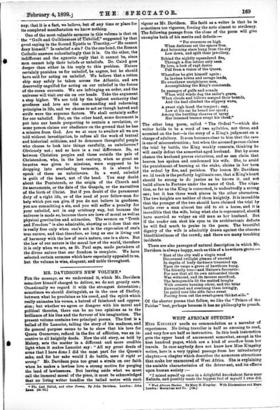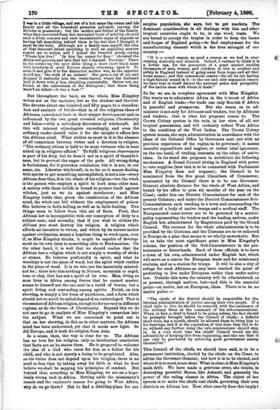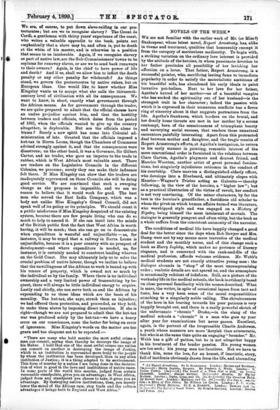WEST AFRICAN STUDIES.*
Miss KINGSLEY needs no commendation as a narrator of experiences. No living traveller is half so amusing to read, and very few are half as instructive. In this book instruction gets the upper band of amusement somewhat, except in the first hundred pages, which are a kind of overflow from her travels. In case anybody does not know how Miss Kingsley writes, here is a very typical passage from her introductory chapter,—a chapter which describes the numerous attractions that make her enamoured of West Africa. She is explaining the amiable characteristics of the driver-ant, and its effects upon human society :- "I mixed myself up once in a delightful knockabout farce near Kalinda, and possibly made the biggest fool of myself I ever did.
• West A fracan Studies. By Mary B. Kingsley. With Illustrations and Maps. London: liacuiii.an and Ou. 121s.) I was in a little village, and out of a but came the owner and his family and all the household parasites pell-mell, leaving the Drivers in possession ; but the mother and father of the family, when they recovered from this unwonted burst of activity, showed such a lively concern and such unmistakable signs of anguish at having left something behind them in the but that I thought it must be the baby. Although not a family man myself, the idea of that innocent infant perishing in such an appalling manner roused me to action, and I joined the frenzied group crying • Where him live?' ' In him far corner for floor! ' shrieked the distracted parents, and into that but I charged. Too true ! There in the corner lay the poor little thing, a mere inert black mass with hundreds of cruel Drivers already swarming upon it. To seize it and give it to the distracted mother was, as the reporter would say, the work of an instant.' She gave a cry of joy and dropped it instantly into the water-barrel, where her husband held it down with a hoe, chuckling contentedly. Shiver not, my friend, at the callousness of the Ethiopian; that there thing wasn't an infant—it was a ham !"
But throughout the book, on the whole, Miss Kingsley writes not as the narrator, but as the student and theorist.
She devotes about one hundred and fifty pages to a classifica-
tion and analysis of fetish—that is, of the religious ideas of Africans, considered both in their simple development and as influenced by the two great revealed religions, Christianity
and Islam—with a subsidiary discussion of witchcraft. All this will interest ethnologists exceedingly, and even the ordinary reader should value it for the insight it offers into the African mind. What strikes us most in it is the absence
of all connection between virtue and a devotion to religion. "The ordinary citizen is held to be most virtuous who is least mixed up in religious affairs." To fulfil religious observances is part of his duty, but he does it not in a spirit of thankful- ness, but to prevent the anger of the gods. All wrong doing is foolishness, for it provokes retaliation, but it is not, in oar sense, sin. Likewise witchcraft, in so far as it means dealing with spirits to get something accomplished, is not a sin—every African does that, it is the whole of his religion--but the witch is the person who employs a spirit to hurt some other man. A society with these beliefs is bound to protect itself against
witches, just as we do against murderers ; and Miss Kingsley holds that, given the constitution of the African mind, the witch can kill without the employment of poison She believes in faith-killing as well as in faith-healing. Two things seem to follow from this set of facts. First, that African law is incompatible with our conception of duty to a subject race; and secondly, that if you wish to civilise the African you must destroy his religion. A religion which affords no incentive to virtue, and which by its nature makes against civilisation, seems a hopeless thing to work upon, even if, as Miss Kingsley thinks, it might be capable of develop- ment on its own lines to something akin to Brahmanism. On the other hand, it is well that we should realise that the African has a religion which is not simply a worship of sticks or stones. He believes profoundly in spirit, and what he worships is not the piece of wood, but the spirit which resides in the piece of wood. It is we who are the materially minded, not he ; there is to him nothing in Nature, mountain or rapid, tree or clay, that has not a spirit of its own. Man, living as man lives in Africa among forces that he cannot master, seems to himself not the one soul in a world of brutes, but a spirit living and contending among spirits. Fetish, on this showing, is simply a low form of pantheism, and a form which should not so much be called degraded as undeveloped. That is the essence of African religion, though its forms vary in different regions, as do the forms of Christianity. Beyond this we do not care to go in analysis of Miss Kingsley's researches into the subject. What we are concerned to point out is that on her showing, in this as in other matters, the African mind has been underrated, yet that it needs new light. So did Europe, and it took its religion from Asia.
In a sense, then, the way is clear for us. The African has no love for his religion, only an intellectual conviction that facts are as he states them. He is prepared to welcome the idea of a God who cares for him as a father for his child, and who is not merely a being to be propitiated. Also, as his virtue does not depend upon his religion, there is no need to fear that by taking away his faith in what he does believe we shall be sapping his principles of conduct. But beyond that, according to Miss Kingsley, we are on a hope- lessly wrong tack in Africa. Setting aside the missionary's reason and the explorer's reason for going to West Africa,
why do we go there Not to find a dwelling-place for our surplus population, she says, but to get markets. The dominant consideration in all dealings with this and other tropical countries ought to be, in one word, trade. We are bound to occupy the tropics in order to keep the looms and forges of England going,—to find employment for the manufacturing element which is the true strength of our
country :—
"It is a sound reason, as good a reason as we had in over- running Australia and America. Indeed, I venture to think it is a better one, for the possession of a great market enables thousands of men, women, and children to live in comfort and safety in England instead of going away from home and all that home means ; and this commercial reason—for all its not having a high-falutin' sound in it -is the one and only expansion reason we have that in itself desires the national peace and prosperity of the native races with whom it deals."
So far we are in complete agreement with Miss Kingsley. She wants as to administer Africa in the irterest of Africa and of English trade,—for trade can only flourish if Africa is peaceful and prosperous. But she wants us to ad- minister it not only for Africans and traders, but by Africans and traders ; that is what her proposal comes to. The Crown Colony system is the ruin, in her view, of all our tropical possessions, and will certainly reduce West Africa to the condition of the West Indies. The Crown Colony system means, she says, administration in accordance with the ideas of the Colonial Office by Governors sent out with no previous experience of the region to be governed; it means wasteful expenditure and neglect, or rather total ignorance, on the one hand, of trading interests, on the other, of native ideas. In its stead she proposes to substitute the following mechanism. A Grand Council sitting in England with power
to vote supplies (bow this is to be connected with Parliament Miss Kingsley does not suggest); the Council to be nominated from the five great Chambers of Commerce; nominated by the Council there is to be one Governor-
General, absolute dictator for the whole of West Africa, and bound by his office to pass six months of the year on the Coast; under him one District Commissioner for each of the present Colonies ; and under the District Commissioners Sob- Commissioners, each residing in a town and commanding the services of a body of native troops and a medical staff. The Europeanised coast-towns are to be governed by a munici- pality representing the traders and the leading natives, under English law, administered by Magistrates paid by the Grand Council, The revenue for the whole administration is to be provided by the Customs. and the Customs are to be collected in Europe on a plan that seems to us wholly unworkable. But let us take the most significant point in Miss Kingsley's scheme, the position of the Sub-Commissioner in the pro- tectorates or hinterlands. Each of these officials is to have a town of his own, administered under English law, which will serve as a centre for European trade and for missionary stations, and as a station for troops. It will he also a city of refuge for such Africans as may have reached the point of preferring to live under European rather than under native law. Outside this town the country will be administered, as at present, through natives, but—and this is the essential point—on native, not on European, ideas. There is to be no native police :-
" The chiefs of the district should be responsible for the internal administration of justice among their own people. If a chief fails in this be should be removed, with the assistance of the military force at the command of the sub-commissioner. When, in fact, a chief is found to be going astray, the fact should be promptly brought before the Council of chiefs; a definite short time, say a month, should be allowed them to bring him to his bearings, and if at the expiration of this time they fail to do so, without any further delay the sub-commissioner should step in. In a very short time the chiefs' Council would see the advisability of keeping this from happening, and also see that it can only be prevented by enforcing good government among themselves."
This Council of the chiefs, we should have said, is to be a permanent institution, elected by the chiefs on the Coast, to advise the Governor-General; but how it is to be elected, and where it is to meet, is not dear. What is clear, is Miss Kingsley's main drift. We have made a grievous error, she thinks, in destroying powerful States, like Ashanti, and generally the power of the ruling classes in Africa. The object of her system is to make the chiefs real chiefs, governing their own districts on African law. Now, what exactly does this imply? We are, of course, to put down slave-raiding in our pro- tectorates ; but are we to recognise slavery ? The Count de
Cardi, a gentleman with thirty years' experience of the coast, who writes a valuable appendix to the book, points out emphatically that a slave may be, and often is, put to death at the whim of his master, and is otherwise in a position that seems to us intolerable. Again, if we recognise slavery as part of native law, are the &lb-Commissioners' towns to be asylums for runaway slaves, or are we to send back runaways to their owners ? Again, is the chief to have power of life and death? And if so, shall we allow him to inflict the death penalty or any other penalty for witchcraft? As things stand, we govern the protectorates by native rulers, but on European ideas. One would like_ to know whether Miss Kingsley wants us to accept what she calls the thirteenth- century level of civilisation with all its consequences. We want to know, in short, exactly what government through the African means. As for government through the trader, we are quite prepared to admit that the official classes have an undue prejudice against him, and that the hostility between traders and officials, which dates from the period of 1865, when the officials wanted to give up the country altogether, is deplorable. But are the officials alone to blame ? Surely a new spirit has come into Colonial ad- ministration of late. Granted that the officials imposed a hut-tax in Sierra Leone, though the Chambers of Commerce advised strongly against it, and that the consequences were disastrous; on the other hand, it was a Governor, Sir Gilbert Carter, and no trader, who gave an impetus to the trade in rubber, which is West Africa's most valuable asset. There are traders on the Legislative Councils in the different Colonies, we presume; surely they can make their influence felt there. If Miss Kingsley can show that the traders are inadequately represented on those Councils she will be doing good service. We are convinced that such a sweeping change as she proposes is impossible, and we see no reason to believe that it would work for good. The best men who served the East India Company, which was a body not unlike Miss Kingsley's Grand Council, did not speak well of its policy or its principles. We should count it a public misfortune if Miss Kingsley despaired of the existing system, because there are few people living who can do so much to help to amend it. If she can instil into the minds of the British public first the fact that West Africa is worth having, it will be much ; then she can go on to demonstrate when expenditure is wasteful and unjustifiable — as, for instance, it may be urged that a railway in Sierra Leone is unjustifiable, because it is a poor country with no prospect of development—and where expenditure is needed, as, for instance, it is certainly needed to construct landing wharves on the Gold Coast. She may ultimately help us to solve the crucial problem of native labour, though we incline to believe that the unwillingness of the African to work is bound up with his tenure of property, which is owned not so much by the individual as by the family. Where there is no individual ownership and a very limited power of transmitting by be- quest, there will always be little individual energy to acquire. Lastly and chiefly, she can serve both us and the African by expounding to us those ideas which are the basis of his morality. The hut-tax, she says, struck them as injustice ; we had offered them protection, and proceeded, as they held, to make them slaves by imposing direct taxation. If she is right—though we are not prepared to admit that the hut-tax war was produced solely by the hut-tax—we have a heavy error on our consciences, none the better for being an error of ignorance. Miss Kingsley's words on the matter are too grave and too eloquent not to be repeated :-
" There are many who hold murder the most awful crime a man can commit, saying that thereby he destroys the image of his Maker. I hold that one of the most awful crimes one nation can commit on another is destroying the image of Justice, which in an institution is represented more truly to the people by whom the institution has been developed, than in any alien institution of Justice ; it is a thing adapted to its environment. This form of murder by a nation I see being done in the destruc- tion of what is good in the laws and institutions of native races. In some parts of the world this murder, judged from certain reasonable standpoints, gives you an advantage; in West Africa, judged from any standpoint you choose to take, it gives you no advantage. By destroying native institutions, then, you merely lower the moral of the African race, stop trade and the culture advantages it brings both to England and West Africa."




































 Previous page
Previous page